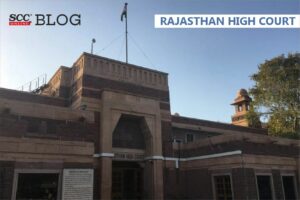Rajasthan High Court: Dinesh Mehta, J. allowed the petition and remarked that expeditious disposal of cases is necessary but equally necessary is to observe mandate of law including procedural law.
The instant petition was filed under Section 482 of the Code of Criminal Procedure, 1973 i.e., CrPC, challenging the order passed by the Trial Court whereby the petitioner was declared absconder and proceedings under Sections 82 and 83 CrPC was initiated.
Counsel for petitioner submitted that without recording its satisfaction about petitioner’s intention to avoid the proceedings or to abscond, the trial Court initiated proceedings under Sections 82 and 83 of CrPC and issued standing warrant against the petitioner, ignoring the facts and law involved in the present case.
Counsel for respondents submitted that the petitioner never received any summons issued by the Trial Court and the petitioner, despite residing in Jodhpur, intentionally avoided the service of the summons and, therefore, the order passed by the trial Court is perfectly just and valid.
The Court observed that on perusal of Sections 82 and 83 CrPC, it is clear that action under Section 82 CrPC is the pre-requisite to proceed under section 83 CrPC. Section 82 CrPC provides the court power to issue a proclamation upon fulfillment of the following conditions
- Court already issued a warrant
- Court has reason to believe (i) such person has absconded or concealed himself such that warrant can’t be executed.
The Court relied on judgment Inder Mohan Goswami v. State of Uttaranchal (2007) 12 SCC 1 wherein it was observed:
“51. In complaint cases, at the first instance, the court should direct serve of the summons along with the copy of the complaint. If the accused seems to be avoiding the summons, the court, in the second instance, should issue a bailable warrant. In the third instance, when the court is fully satisfied that the accused is avoiding the court’s proceeding intentionally, the process of issuance of the non bailable warrant should be resorted to. Personal liberty is paramount; therefore, we caution courts at the first and second instance to refrain from issuing non-bailable warrants.”
The Court observed that the Court initiated action under sections 82 and 83 CrPC in the absence of any cogent reason to show that the accused is absconding such that warrant cannot be served. A mere recording a ‘it appears’ that accused has absconded is insufficient to proceed under section 82 CrPC because of the expression “such warrant cannot be executed”.
The Court noted that the alleged absconding or concealment must be for the purpose of avoiding the warrant. The expression “such warrant cannot be executed” is extremely important because what is required to be ascertained is, that the accused is absconding despite being aware of the warrant. In the absence of such a finding, it cannot be said that the accused is dodging or evading the warrant.
The Court opined that before issuing standing warrant and initiating proceedings under Sections 82 and 83 CrPC, the trial Court is required to record a categorical finding/ satisfaction that in spite of knowledge of the warrant, the petitioner has avoided appearance in the Court or has evaded the warrant.
The Court further noted that the endeavor of a Court should be to ensure proper compliance of the statutory provisions and service of the summons as mandated by law. Service of summons is a bed-rock of principles of natural justice. The Courts should not rush to issue a standing warrant and initiate proceedings under Sections 82 and 83 CrPC, unless they are satisfied that the accused is intentionally evading or circumventing the warrants in order to avoid prosecution.
The Court thus held the present petition is allowed and impugned order dated May 16, 2022 is quashed and set aside. [Bhavin Tanwar v. State of Rajasthan v. State of Rajasthan, SB Criminal Misc. (Pet) No 3072 of 2022, decided on May 25, 2022]
Appearances
For Petitioner(s): Mr. C.S. Kotwani and Ms. Swati Shekhat
For Respondent(s): Mr. Mahipal Bishnoi

